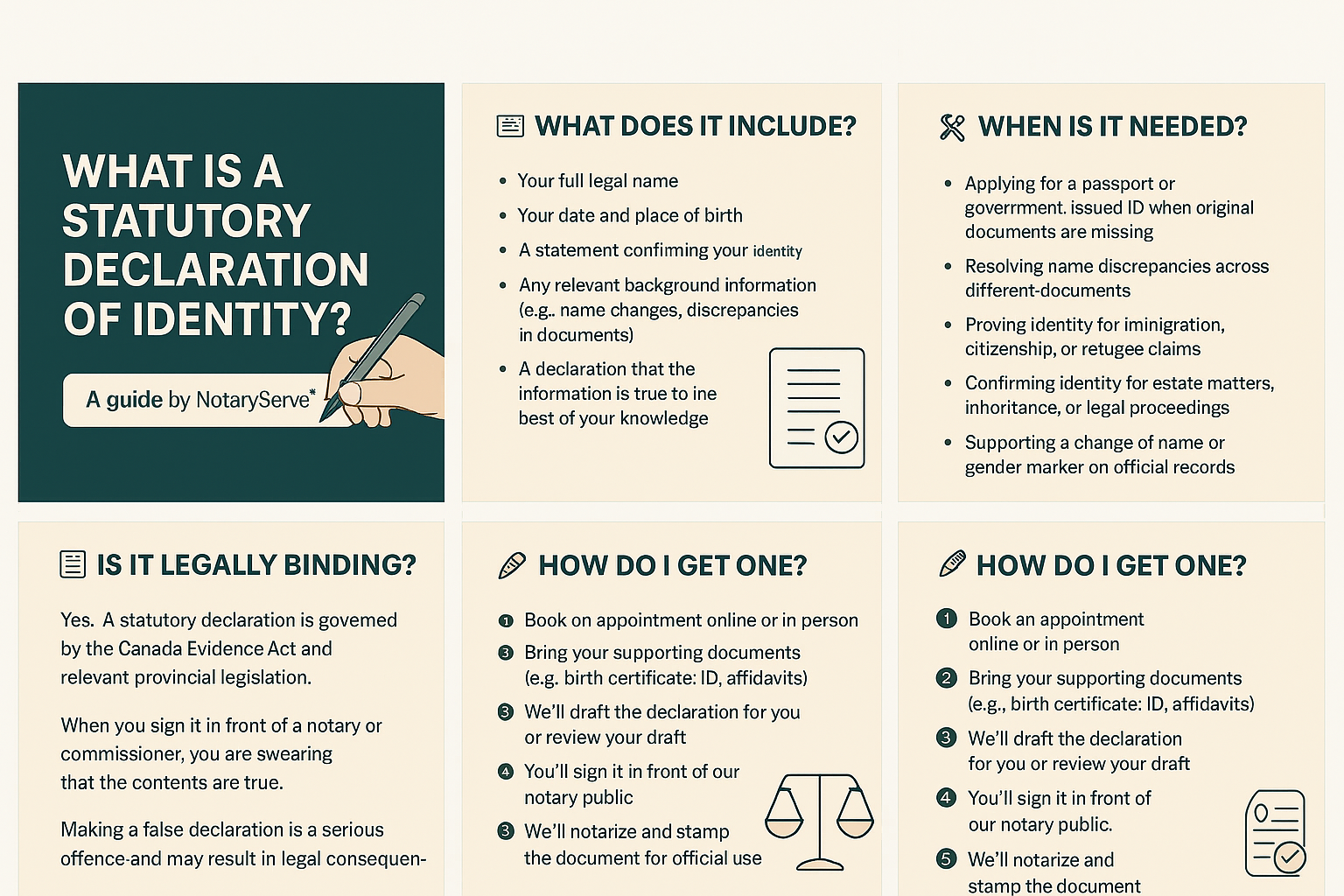A Statutory Declaration of Identity is a legal document used in Canada to formally confirm who you are when regular identification documents are missing, unclear, or don’t match your other records:
What it is:
A Statutory Declaration of Identity is a written statement where you confirm important facts about your identity. You personally declare that the information you are giving is true.
Why is it used:
This document is often needed when you must prove your legal name, date of birth, or other personal information, but you cannot show the usual official documents, or the documents you have don’t match.
NotaryServe provides professional notary services for Statutory Declarations of Identity, ensuring your documents are properly witnessed and legally valid. Contact NotaryServe at (613) 558-5363 or contact@notaryserve.ca for assistance.
2. What the Document Must Include
For the declaration to be valid, it must include all of the following:
Your Personal Information
- Your full legal name
- Your date of birth
- Your place of birth
A Statement Confirming Your Identity
A clear sentence saying that you are confirming the details of your identity.
Background Information (if needed)
Any information that helps explain the situation, such as:
- Differences between your documents
- Past name changes
- Missing or unavailable documents
A Sworn Declaration
A statement saying that everything you have written is true to the best of your knowledge.
Signing and Witnessing
- Your signature, made in front of a Notary Public or Commissioner for Oaths
- Notary or commissioner for oaths' signature and official stamp/seal, confirming that the declaration was signed in their presence
3. When You May Need A Statutory Declaration of Identity
You may be asked to provide a Statutory Declaration of Identity in situations such as:
Government ID Applications
- When you apply for a passport or other government-issued ID, but do not have the required original documents.
Fixing Document Problems
- When your documents contain different names, different birthdates, or other inconsistencies.
Immigration, Citizenship, or Refugee Matters
- When immigration or citizenship authorities need extra proof of your identity.
Legal or Estate Issues
- When identity needs to be confirmed for inheritance matters, court proceedings, or other legal processes.
Updating Official Records
- When applying to change your name or update your gender marker on official government records.
4. Legal Status and Consequences
It Is Legally Binding
A statutory declaration is a serious legal document.
Governed by Law
These declarations are covered by:
- The Canada Evidence Act, and
- Provincial or territorial legislation
You Are Swearing It Is True
When you sign in front of a Notary or Commissioner, you are solemnly declaring that the information is correct.
False Information Has Serious Consequences
Lying in a statutory declaration can lead to legal penalties, including criminal charges such as perjury.
5. How to Get and Complete a Statutory Declaration of Identity
Preparing the Document
You can write the declaration yourself.
However, it is strongly recommended that you get help from a professional (such as a Notary Public) to make sure the document is accurate and acceptable for its intended purpose.
Helpful Tips
- Be completely truthful and accurate.
- Use your full legal name and correct dates.
- Bring any documents you have, even if they are old, damaged, or expired.
- Explain why you need the declaration so the person preparing or witnessing it can ensure it meets the required criteria.
Need Help? NotaryServe® Can Prepare and Witness Your Declaration
Our team at NotaryServe® can draft the statutory declaration for you or review your draft to ensure it meets legal requirements.
Contact Us
📞 Phone: 613-558-5363
📧 Email: contact@notaryserve.ca
🖥️ Online Booking: notaryserve.ca/contacts/
Disclaimer
This guide is for general information only and is not legal advice. Requirements may vary depending on the purpose of the declaration and the organization requesting it. For advice tailored to your situation, please contact a qualified professional or speak with one of our notaries.
© NotaryServe®

